How to play this game:
A murder happened at the Baker Street. Players pretend as detectives and the goal is to collect as many real clues as possible to find the murderer. Detectives often meet at the bar every evening to exchange some clues with each other. Some detectives would like to cooperate with others by telling real clues, some may not. Players need exchange one clue by switching the clue cards with every other player once at every turn. Sheriff wants detectives to find the murderer in 5 days and will reward the one who collects the most clues and find the murderer. Sherlock Holmes hears about that and decides to help. Once both players exchange the real clues, he will provide both of them with two new clues. If both cheat, they will not be provided any new clues. If one detective cheats, and the another one cooperates, the detective who cheats will get two more new clues, the other one will get nothing.
At the beginning, each player will be given a character card. Some character cards have the feature and players should not show it to others. Each player will also be given two clue cards: one fake and one real. The game will be ended after 5 turns or the there’s no more clues. The player who gets the most of real clues win the game.
Those are the card I designed:
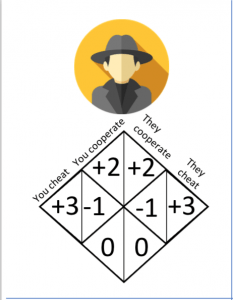
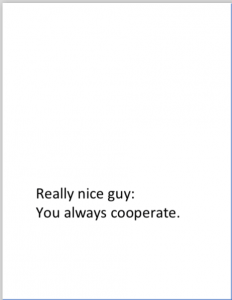
Character cards: This is the character card. The front of this card has a small icon and a parallelogram to help you check the how many new clues you can get according to your and other detectives’ actions. The back of the card has the description of the characters.
- Character is one of following:
- Really nice guy: You always cooperate.
- Cheater: You always cheat.
- Copycat: You start with cooperation. Then, you copy whatever the player did to you at the last round.
- Simpleton: You start with cooperation. If other players cooperate back to you, you do the same thing as last move. If others cheat back to you, you do the opposite move as last move.
- Blank space: You can do anything you want.

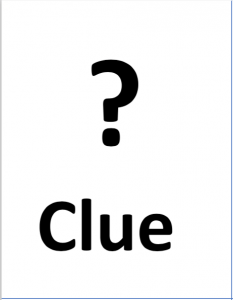
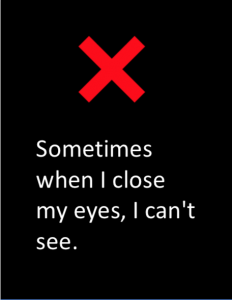
Clue cards: This is the clue card. The real clue is marked with a check, and the fake clue marked with a “X”.
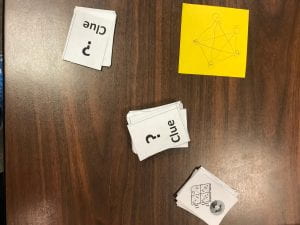
Art Statement:
Most of my idea is inspired by the reading of Avant-garde Video Games. From the book, I learn that avant-garde game is not only a game to play or fantastic visual effects to watch, but also a way to interact with players and to express something valuable to players. Authors can tell something to player through this game. Author’s expression and players’ reactions are also the most important parts of the avant-garde game. For example, the game September 12th impressed me a lot. It’s trying to tell players that the war cannot eliminate terrorists completely. Instead, the war creates fears and chaos and even leads more terrorists. Some other really good avant-garde games also try to express something valuable to players and invoke them to think about the problem or issue in a different way. Therefore, I want that my game is fun to play as well as will address some society problems. Sarcasm is an effective tool and often used to impress players. I also decide to use it in my game. (I will talk about sarcasm in later paragraph.)
My initial idea is to create a board game which expresses the issue of trust. Inspired by my last intervention project, I was thinking about some reasons which cause people not to sit together. One reason jumped out of my mind was distrust. People would not likely trust strangers because of their awareness of protecting themselves. Moreover, I found that some people wanted to win the game and left his initial group members during the game playing of Room at the Top. It was definitely a great strategy to win the game, but if you did so, other people could hardly trust you anymore. In real life, some people are willing to betray other’ trusts to gain benefits. Therefore, I want to create a game which includes trust and betrayal to see how people will react. Will they cooperate to win or will they cheat to win? Will they trust each other or not?
I am also inspired by Game Theory that everyone wants to win the game. People could choose to cooperate with others or cheat on others to win. Cooperation builds on the trust, and cheating will definitely destroy the trust. In my game, the best situation is that players exchange the real clues with each other for the win-win cooperation. However, there’s another situation that player can choose to cheat and get more clues, but it would destroy the trust and won’t get more benefits from other players anymore. Players can choose any strategy they want and they will see how the strategy will affect the result. People who cheat won’t get more clues if they destroy their trust. They may win in the short run, but people who choose to win-win strategy will win in the long run.
I added different character features, since I think these characters can represent people in our life. The really nice guys represent our family or our best friends. They will always trust you and provide you help, and you also trust them and should help them too. Copy cats can be our normal friends or classmates, since if you treat them well, they’ll also treat you well. Once you destroy the trust between you and your normal friends, it would be really hard to fix the relation. Cheaters often appear around us, but as long as we ignore them we are fine. I think my game is a good chance to experience how to cooperate with other to build the trust and how you destroy the trust.
While designing my cards, I also think about how to make them look clearer which will give the instruction directly and clearly like the score in Yoko Ono’s Grapefruit. Therefore, I create the small parallelogram for players to check the results they will have. At this time, I use the mathematical symbol and numbers to make the “score” instead of only using the words.
For sarcasm, cheaters can get more cards than others and goal of the game is to win. So why don’t we choose to cheat all the time? However, if everyone cheats, no one will get any more clues which means we will never find the murderer. What if we choose a win-win strategy? Then you might lose the game, since others are getting more clues at the same time! I think it’s a dilemma we also have in our society and the whole world. Everyone intends to be the best and the competition is grim, so people sometimes have to sacrifice their trust for more benefits. Competition in our world is nature, but I think people do have chances to choose a better and fair way to win instead of cheating others. A good way to evolve the trust is to have more communication to find the win-win situations. Our life is like a game, we might think the game rules us, but it’s actually our actions decide what the game or our life will be. We are keys to make our world better.
Interesting fact:
Copycat should be the last winner if there are lots of turns, since their principles are “live or let live”. They can cooperate with people they trust and not cooperate with people they distrust.
